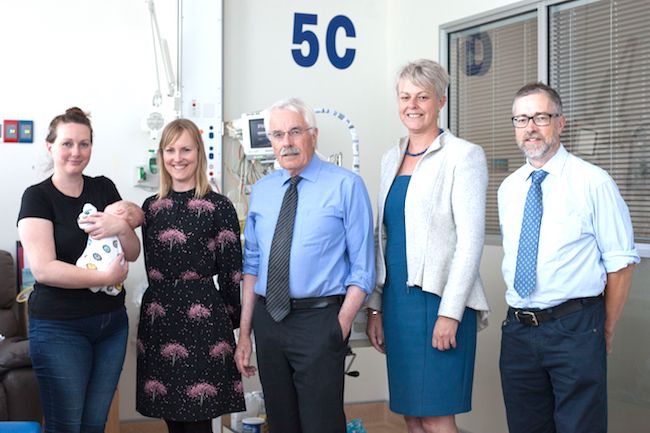
New mum Katie Seddon and baby Adeline are helping PhD candidate Lisa Kremer, and her supervisors Associate Professor David Reith, Associate Professor Natalie Medlicott and Associate Professor Roland Broadbent, with a study surrounding a routine eye test performed on premature babies.
A Cure Kids grant is funding a study into the potential advantages of using smaller amounts of eye drops for routine eye tests on premature babies.
The study will be carried out by a collaboration of University of Otago staff based out of the Dunedin, Christchurch and Wellington School of Medicine, Women's and Children's departments, Deans Department, and the School of Pharmacy, Dunedin.
Associate Professor David Reith (Lead Investigator), Lisa Kremer (PhD candidate), Associate Professor Roland Broadbent, Associate Professor Natalie Medlicott, Dr Liza Edmonds, Dr Nicola Austin, and Dr Max Berry are looking forward to commencing the study within the next few months.
Lisa says retinopathy is a common eye condition amongst premature infants, and routine eye tests are carried out all over New Zealand to screen for this eye disease.
“A successful eye test is critical as missing the early signs of retinopathy can mean that the short time frame to deliver treatment may be missed. This may leave the infant with irreversible blindness, and a lifetime of consequences of that for the child and their family.
“Our study is designed to answer important questions regarding the eye drops that are commonly used during the screening process. The eye drops are needed to dilate the pupil so the ophthalmologist can do the eye test.
“We are very grateful to Cure Kids for giving us this prestigious grant to be able to investigate if very small amounts of these eye drops work in premature infants, and if they are less likely to cause unwanted adverse effects,” she says.
“When we complete this study, we are hoping that the data will be able to be used to influence both local and international guidelines. It may be that the best thing we can do is give little drops for little eyes, but we won't know if this hypothesis is true until the end of the study.”
